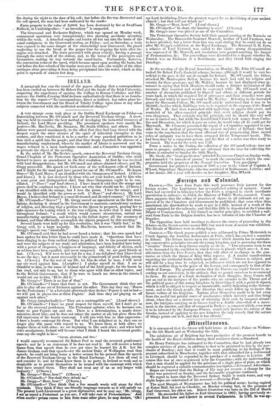_foreign nub ToIonial
Feaaice.—The news from Paris this week possesses little interest for thee foreign reader. The Legislature has accomplished nothing of moment. Count Daru had succeeded in bringing before the Peers a proposal to check inordinate speculation in railways; to which the Minister of Public Works assented. Count Dams suggests that the selling of promises of shares in all railroads not yet ap- proved of by the Chambers and Government be prohibited; that even when thus sanctioned, the shareholders be made to v in a "fifth, instead of tenth of the capital required for the railroads; and that this fifth be deposited at the Caisse des Depots et Consignations. A bill framed on similar principles, to establish a rail- road from Paris to the Belgian frontier, has been introduced into the Chamber of Deputies. The Opposition have held meetings to discuss the course of proceeding in the debates on the Secret-service-money Bill; but much want of accord was exhibited. The friends of Ministers were in strong hopes.
GREECE.—The Greek papers publish a note addressed by Prince Metternich to Count Appony, the Austrian Ambassador at Paris, which has excited a sensation in Athens. The Prince insists upon the interest which Austria has in maintain- ing conservative principles towards the young kingdom, and in procuring the three "creative" Powers to keep Greece exactly as she is. "Two measures seem to us to be demanded by the condition in which Greece is placed; which are-1. A ma nifestation from the Five Powers that they will allow of no change in the gua- rantee on which the throne of King Otho reposes. 2. A similar manifestation regarding the territorial limits which mark the state." "Greece is subject, and will still for a long time be subjected, to influences which are not less opposed to her own welfare than to the peace of the Levant, and consequently to that of the whole of Europe. The greatest service that the Powers can render Greece is, ac- cording to our conviction, in the attitude that we permit ourselves to recommend to them. By means of a frank declaration of their thoughts, these Courts wild put an end to the intrigues of the parties who are enemies to the Throne and of the political peace of this young kingdom, by furnishing it with a point de depart, which it ivillhe obliged to respect as immoveable, and by indicating to the Govern- ment, and to the Greek people, the direction they must follow up to insure the future welfare of the kingdom. Nations allow themselves easily to be led away from the useful but painful route of amelioration which industry and time bring about, when they see a shorter way of obtaining their ends by conquest abroad: now, the intrigues carrying on in Greece tend to a double aim—that of a move- ment in the interior, and that of conquest in Turkey; a conquest which, even were it to be tolerated by the European Powers, would only increase the misery of the Greeks, instead of applying to the new kingdom the only remedy that the nature of things points out to it, and that it has already."


























 Previous page
Previous page